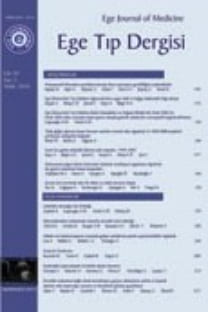Adjuvan kemoterapi alan erken evre meme kanserli hastalarda lenfosit alt tiplerinin flow sitometrik analizi
Analysis of lymphocyte subtypes by flow cytometry after adjuvant chemotherapy for early-stage breast cancer
___
- 1) Cancer facts and figures 2009. American Cancer Society. www.cancer.org (accessed on march 2010)
- 2) Effects of chemotherapy and hormonal therapy for early breast cancer on recurrence and 15-year survival: An overview of the randomised trials. Early Breast Cancer Trialists Collaborative Group (EBCTCG). Lancet 2005; 365:1687–1717.
- 3) Levine MN, Whelan T. Adjuvant Chemotherapy for Breast Cancer -- 30 Years Later. NEJM 2006; 355:1920-1922.
- 4) Citron ML, Berry DA, Cirrincione C, et al: Randomized trial of dose-dense versus conventionally scheduled and sequential versus concurrent combination chemotherapy as postoperative adjuvant treatment of node-positive primary breast cancer: First report of Intergroup Trial C9741/Cancer and Leukemia Group B Trial 9741. J Clin Oncol 2003; 21:1431–1439.
- 5) Gardner RV. Long term hematopoietic damage after chemotherapy and cytokine. Frontiers in Bioscience 1999;4:47-57.
- 6) van der Most RG, Currie A, Robinson BW, Lake RA. Cranking the immunologic engine with chemotherapy: Using context to drive tumor antigen cross-presentation towards useful antitumor immunity. Cancer Research 2006;66(2):601-604.
- 7) Guillaume T, Rubinstein DB, Symann M. Immune reconstitution and immunotherapy after autologous hematopoietic stem cell transplantation. Blood 1998;92:1471.
- 8) Atkinson K. Reconstruction of the haemopoietic and immune systems after marrow transplantation. Bone Marrow Transplant 1990;5:209.
- 9) Beitsch P, Lotzova E, Hortobagyi G, & Pollock R. Natural immunity in breast cancer patients during neoadjuvant chemotherapy and after surgery. Surgical Oncology 1994, 3(4):211-219.
- 10) Bowden RA. Infections in blood and bone marrow transplant patients: Allogeneic and autologous transplantation. Glauser MP, Pizzo PA, ed. Management of Infections in Immunocompromised Patients. 2000; 189-218.
- 11) Kang DH, Weaver MT, Park NJ, et al. Significant impairment in immune recovery after cancer treatment. Nurs Res 2009;58(2):105-14.
- 12) Martinez C, Urbano-Ispizua A, Rozman C, et al. Immune reconstitution following allogeneic peripheral blood progenitor cell transplantation: comparison of recipients of positive CD34+ selected grafts with recipients of unmanipulated grafts. Exp Hematol 1999;27(3):561.
- 13) Moretta A, Maccario R, Fagioli F, et al. Analysis of immune reconstitution in children undergoing cord blood transplantation. Exp Hem 2001;29:371.
- 14) Mustafa MM, Buchanan GR, Winick NJ, et al: Immune recovery in children with malignancy after cessation of chemotherapy. J Pediatr Hematol Oncol 1998; 20:451.
- 15) Nachbaur D, Kropshofer G, Heitger A, et al. Phenotypic and functional lymphocyte recovery after CD34+-enriched versus non-T cell-depleted autologous peripheral blood stem cell transplantation. J Hematother Stem Cell Res 2000;9(5):727.
- 16) Ottinger HD, Beelen DW, Scheulen B, Schafer UW, et al. Improved immune reconstitution after allotransplantation of peripheral blood stem cells instead of bone marrow. Blood 1996;88:2775.
- 17) Pedrazzini A, Freedman AS, Anderson J, et al. Anti B cell monoclonal antibody ourged autologous bone marrow transplantation for B cell non-Hodgkin's lymphoma: Phenotypic reconstitution and B cell function. Blood 1989; 74:2203.
- 18) Santin AD, Hermonat PL, Ravaggi A, et al. Effects of concurrent cisplatinum administration during radiotherapy vs. radiotherapy alone on the immune function of patients with cancer of the uterine cervix. International Journal of Radiation Oncology, Biology, and Physics 2000;48(4):997-1006.
- 19) Steele, TA. Chemotherapy-induced immunosuppression and reconstitution of immune function. Leukemia Research 2002;26(4): 411-414.
- 20) Belka C, Ottinger H, Kreuzfelder E, Weinmann M, et al. Impact of localized radiotherapy on blood immune cells counts and function in humans. Radiotherapy and Oncology 1999;50(2):199-204.
- 21) Sewell HF, Halbert CF, Robins RA, et al. Chemotherapy-induced differential changes in lymphocyte subsets and natural-killercell function in patients with advanced breast cancer. International Journal of Cancer 1993;55(5):735-738.
- 22) Solomayer EF, Feuerer M, Bai L, et al. Influence of adjuvant hormone therapy and chemotherapy on the immune system analysed in the bone marrow of patients with breast cancer. Clinical Cancer Research 2003;9(1):174-180.
- 23) Wiltschke C, Krainer M, Budinsky AC, et al. Reduced mitogenic stimulation of peripheral blood mononuclear cells as a prognostic parameter for the course of breast cancer: A prospective longitudinal study. British Journal of Cancer 1995;71(6):1292-1296.
- 24) Arduino S, Tessarolo M, Bellino R, et al. Reduced IL-2 level concentration in patients with breast cancer as a possible risk factor for relapse. European Journal of Gynaecological Oncology 1996; 17(6):535-537.
- 25) Bachelot T, Ray-Coquard I, Menetrier-Caux C, et al. Prognostic value of serum levels of interleukin 6 and of serum and plasma levels of vascular endothelial growth factor in hormone-refractory metastatic breast cancer patients. British Journal of Cancer 2003;88(11):1721-1726.
- 26) Bozcuk H, Uslu G, Samur M, et al. Tumour necrosis factor-alpha, interleukin-6, and fasting serum insulin correlate with clinical outcome in metastatic breast cancer patients treated with chemotherapy. Cytokine 2004;27:58-6.
- 27) Lum LG: The kinetics of immune reconstitution after human marrow transplantation. Blood 1987;69:369.
- 28) Gokmen E, Raaphorst FM, Boldt DH, and J.M. Teale. Immunoglobulin heavy chain third complementarity determining regions (H CDR3s) post-stem cell transplantation do not resemble the developing human fetal H CDR3s in size distribution and immunoglobulin gene utilization. Blood 1998;92:2802.
- 29) Sullivan KM, Agura E, Anasetti C, et al. Chronic graft vs. host disease and other late complications of bone marrow transplantation. Semin Hematol 1991; 28:250.
- ISSN: 1016-9113
- Yayın Aralığı: Yılda 4 Sayı
- Başlangıç: 1962
- Yayıncı: Ersin HACIOĞLU
Yenidoğanın solunum sıkıntısında nadir neden: doğumsal şilotoraks
E. CAN, A. BÜLBÜL, S. USLU, S. CÖMERT, F. BOLAT, A. NUHOĞLU
M. TÜRKMEN, İ. ERTAM, G. KANDİLOĞLU, T. DERELİ
Bruselloz tanılı 33 olgunun retrospektif değerlendirilmesi
T. ÇATAKLI, N. KILIÇ, Y. DALLAR
Milk alkali syndrome with acute renal failure requiring hemodialysis treatment
V. T. YILMAZ, E. ALKAN, A. B. AVCI, İ. SÜLEYMANLAR, G. SÜLEYMANLAR
C. KAYAALP, T. ORUĞ, A. E. DEMİRBAĞ, F. ATALAY, Behlül BAYDAR
Primer sjögren sendromlu olgularda sakroiliit sıklığı nedir?
G. KARABULUT, G KİTAPÇIOĞLU, M. ARGIN, Y. KABASAKAL
Swyer-James (MacLeod ) sendromu
H.T. NACAROĞLU, N. TUYGUN, G. ÇINAR, G. TANIR
Ağaçtan düşme sonrası perine ve sfinkter yaralanması olmadan penetran rektum ve mesane yaralanması
Postmenopozal cinsel fonksiyon bozukluklarında kan lipid profilinin ve hormonların etkileri
